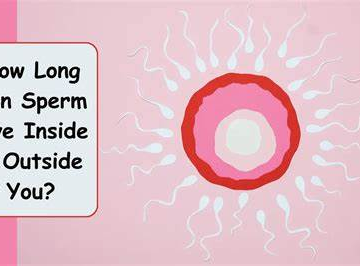
When Do Guys Stop Producing Sperm? A Deep Dive Into Male Fertility
Men’s fertility has long been a topic of curiosity and concern. A common question that comes up is: “When do guys stop producing sperm?” Unlike women, who experience menopause and a clear end to egg production, men don’t typically have a hard cutoff date for sperm production. However, there’s a lot more to understand about how sperm production works, how it changes over time, and what factors can affect a man’s fertility as he ages.
In this in-depth guide, we’ll explore:
- How sperm production works and what influences it.
- Whether (and when) men stop producing sperm altogether or see a decline in fertility.
- What research says about sperm quality at different life stages.
- Lifestyle factors and medical conditions that impact sperm health.
- Practical steps to maintain or improve sperm quality over time.
- Little-discussed topics, including DNA fragmentation, epigenetics, and the latest research findings.
- Frequently asked questions about sperm production and male fertility.
By the end, you’ll have a clearer idea about male fertility—from adolescence to old age—and learn how to take proactive steps toward better reproductive and overall health.
The Basics of Sperm Production
Understanding the Male Reproductive System
Sperm production (also known as spermatogenesis) takes place primarily in the testicles. The process involves several steps:
- Formation of Germ Cells: Inside each testicle are tiny tubes called seminiferous tubules. Immature cells, called germ cells, begin to develop into more specialized sperm cells.
- Maturation: These cells undergo division and change shape, eventually forming the head, midpiece, and tail characteristic of sperm.
- Storage and Transportation: Once mature, sperm move to the epididymis (a coiled tube behind each testicle) for storage. During ejaculation, sperm travel through the vas deferens, mix with seminal fluid, and exit the body as semen.
Key hormones—including testosterone, follicle-stimulating hormone (FSH), and luteinizing hormone (LH)—work together to regulate this cycle. In a healthy adult male, each cycle of sperm production can take around 64 days, though new sperm are produced constantly in overlapping waves.
What Happens at Puberty?
- Start of Sperm Production: Spermatogenesis typically begins during puberty, around ages 12–14.
- Testosterone Surge: Puberty is triggered by a rise in hormones like LH and FSH, prompting the testicles to grow and begin sperm production.
- Seminal Milestones: Once a boy hits puberty, sperm production starts and continues, in theory, for the rest of his life.
The idea that men keep making sperm throughout adulthood is generally correct, but quantity and quality can vary a lot depending on age, health, and lifestyle.
Common Misconceptions About When Men Stop Producing Sperm
A big misconception is that men completely stop producing sperm at a certain age, similar to menopause in women. While men do experience a gradual decline in reproductive hormone levels over time—a process sometimes referred to as andropause—it’s not usually as abrupt or final as menopause.
-
Myth: Men can’t have children after 50.
- Reality: Many men in their 50s, 60s, and even 70s have fathered children. Sperm production may slow down or the quality may decline, but it rarely comes to a complete halt.
-
Myth: Sperm quality is always excellent at younger ages.
- Reality: Even younger men can have lower sperm counts or motility issues due to genetics, lifestyle factors (like heavy smoking), or health conditions (such as varicocele).
The body doesn’t come with a “stop sperm” switch. Instead, there is a gradual shift that might reduce fertility or make conception more challenging, but not impossible, at older ages.
The Role of Age in Sperm Quality and Quantity
Does Age Really Matter?
While men don’t typically have a strict age limit for having children, age-related changes do occur:
- Decline in Testosterone: After about age 30, testosterone levels tend to drop by roughly 1% per year in many men, affecting libido, energy levels, and—potentially—fertility.
- Lower Sperm Count: Several studies suggest that sperm counts and semen volume may decrease over time, particularly as men reach their 40s and beyond.
- Reduced Motility: Older men often experience a decrease in sperm motility (the ability of sperm to move effectively), making fertilization harder.
- Increased DNA Fragmentation: Newer research highlights that as men age, their sperm may show more DNA fragmentation—tiny breaks in the genetic material that can affect embryo quality and increase the risk of certain health issues in offspring.
Advanced Paternal Age Concerns
“Advanced paternal age” usually refers to men over 40 or 45. Some studies link older paternal age to:
- Higher chances of genetic mutations in sperm.
- Elevated risk of certain disorders in children, like autism or schizophrenia.
- Longer time to achieve pregnancy when compared with couples who have younger male partners.
It’s important not to panic if you’re older. These risks are typically small on a statistical level, and many men have healthy children later in life. However, knowing these potential risks can help you make more informed decisions.
Additional Factors That Affect Sperm Production
Age isn’t the only player in the game. Lifestyle choices, environment, and underlying health conditions can significantly influence sperm count, motility, and morphology (shape).
Lifestyle Factors
-
Diet and Nutrition
- ✔️ Protein-Rich Foods: Lean meats, fish, legumes, and dairy can support hormonal balance.
- ✔️ Antioxidant-Rich Fruits and Vegetables: Berries, spinach, kale, and broccoli can reduce oxidative stress.
- ❌ Excessive Processed Foods: Overly processed or high-sugar diets may contribute to obesity and hormonal imbalances.
-
Exercise and Weight
- ✔️ Moderate Exercise: Regular physical activity boosts overall health and can help maintain a healthy body weight, supporting better fertility.
- ❌ Extreme Training: Overtraining or using anabolic steroids can suppress natural testosterone production and harm sperm quality.
-
Alcohol and Substance Use
- ✔️ Low to Moderate Alcohol: Occasional drinks are unlikely to severely impact sperm health, though minimizing alcohol is generally recommended for fertility.
- ❌ Heavy Drinking, Smoking, or Drug Use: These habits can reduce sperm count and motility, and increase the risk of genetic abnormalities.
-
Stress Management
- ✔️ Mindfulness and Relaxation: Chronic stress elevates cortisol, which can lower testosterone and disrupt sperm production.
- ❌ Long-Term High Stress: Prolonged stress can directly affect the hypothalamic-pituitary-gonadal axis, a critical hormonal pathway for sperm production.
Environmental Factors
- Exposure to Toxins: Pesticides, heavy metals, and chemicals like BPA (found in certain plastics) can disrupt hormones and harm sperm.
- Radiation or Heat: Regular use of hot tubs, saunas, or placing a laptop directly on the lap for extended periods can raise scrotal temperature, negatively impacting sperm production.
- Air Quality: Polluted environments with high levels of particulate matter are associated with lower sperm quality, based on emerging research.
Medical and Hormonal Conditions
- Varicocele: An enlargement of veins within the scrotum that can impair sperm production.
- Hormonal Imbalances: Low testosterone or elevated prolactin can disrupt normal spermatogenesis.
- Infections: Certain sexually transmitted infections or viral illnesses (like mumps) may affect testicular function.
- Genetic Issues: Klinefelter syndrome, for instance, involves an extra X chromosome and can impact male fertility.
Medications and Treatments
- Chemotherapy and Radiation: Cancer treatments can drastically reduce or halt sperm production, sometimes permanently.
- Anabolic Steroids: Commonly misused for bodybuilding, these can lead to testicular shrinkage and low sperm counts.
- Antidepressants or Blood Pressure Medications: Some drugs may interfere with ejaculation or hormone levels.
How to Maintain or Improve Sperm Health
Men of all ages can take steps to optimize fertility. These strategies apply to adolescents aiming for a healthy future, men in their 30s and 40s planning a family, or older men wanting to keep their reproductive health in the best shape possible.
Diet and Supplements
Consider incorporating certain foods and supplements that boost sperm quality:
| Nutrient | Food Sources | Potential Benefits for Sperm Health |
|---|---|---|
| Zinc | Oysters, beef, pumpkin seeds | Supports hormone regulation and sperm formation |
| Folate (B9) | Spinach, beans, fortified cereal | May reduce sperm DNA damage |
| Vitamin D | Salmon, egg yolks, sunlight | Linked to testosterone and improved sperm motility |
| CoQ10 | Organ meats, certain supplements | Antioxidant that can enhance motility |
| Omega-3 Fats | Fatty fish (salmon, mackerel), flaxseeds | Supports membrane fluidity in sperm cells |
Pro Tip: Always talk to a healthcare provider before starting any new supplements, especially if you have pre-existing conditions or take other medications.
Healthy Habits
- Regular Exercise: Aim for at least 150 minutes of moderate-intensity exercise per week.
- Healthy Sleep: Studies show 7–8 hours of sleep per night supports hormone regulation, including testosterone.
- Stress Reduction: Techniques like yoga, meditation, or simple walks can help keep cortisol levels in check.
Avoiding Sperm Health Pitfalls
- Limit Hot Environments: Avoid prolonged exposure to heat sources (hot tubs, saunas).
- Cut Back on Alcohol: Stick to low or moderate intake.
- Quit Smoking: Tobacco use is strongly linked to decreased sperm quality and count.
- Be Careful with Medications: If you suspect a prescription is affecting your fertility, consult your doctor.
Hormone Optimization
As men age, testosterone and other hormones may require closer monitoring. If you experience symptoms like low libido, fatigue, or depression—and suspect hormonal imbalances—speak to a medical professional. Hormone replacement therapy (HRT) may be an option, but it’s not for everyone, as external testosterone can sometimes suppress the body’s natural sperm production.
The Latest Research: Beyond the Basics
One area that doesn’t always get enough attention in popular articles is how new scientific findings are reshaping our understanding of sperm health.
DNA Fragmentation and Epigenetics
- DNA Fragmentation: Recent studies highlight the importance of sperm DNA integrity. Even if sperm count and motility look normal, high DNA fragmentation can reduce fertility or raise the risk of miscarriages.
- Epigenetics: Environmental factors can trigger changes in the way genes express themselves without altering the DNA sequence. This can affect not just fertility but also potentially the long-term health of any children conceived.
Role of Sleep Disorders
Research in 2023 and 2024 has focused on how conditions like obstructive sleep apnea might lower testosterone and impair sperm health. Improving sleep quality through medical interventions (e.g., CPAP machines) or lifestyle changes (losing weight, avoiding alcohol before bed) can have a positive impact.
Advanced Fertility Treatments
- IVF with ICSI: In cases of severe male factor infertility, In Vitro Fertilization (IVF) combined with Intracytoplasmic Sperm Injection (ICSI) can help fertilize eggs with a single sperm under a microscope.
- Sperm Freezing: Also known as cryopreservation, it’s increasingly popular for men who wish to preserve fertility before undergoing medical treatments or simply plan for the future.
Potential Future Therapies
- Stem Cell Therapies: Early-stage research is investigating whether stem cells can be used to generate healthy sperm in men who’ve lost fertility.
- Gene Editing: Although still in the realm of experimental science, technologies like CRISPR may eventually help correct certain genetic causes of male infertility.
Testing and Medical Advice: Taking Action
If you’re concerned about your sperm production or fertility, here’s how to proceed:
When to See a Doctor
- Difficulty Conceiving: If you’ve been trying for a year (or six months if over age 35) without success, consider seeking professional advice.
- Symptoms of Hormonal Issues: Persistent low libido, fatigue, or muscle weakness might indicate a hormonal imbalance.
- History of Testicular Injuries: Past injuries, surgeries, or other conditions could affect fertility.
Fertility Testing
A semen analysis is usually the first step. It checks:
- Sperm Count (Concentration)
- Motility (Movement Ability)
- Morphology (Shape)
- Volume of Semen
If results are abnormal, the doctor may recommend hormone tests, genetic screenings, or ultrasounds to check for varicocele or other structural issues.
Possible Treatments
- Surgery: Varicocele repair can sometimes improve sperm parameters.
- Medications: Certain drugs can boost testosterone or address hormonal imbalances.
- Lifestyle Interventions: Weight loss programs, quitting smoking, or stress management can yield significant improvements in sperm health.
Real-World Examples and Q&A
Sometimes, seeing practical, relatable examples helps clarify the picture.
Can a 60-Year-Old Still Father a Child?
Yes, it’s possible. While sperm quality may be lower, there’s no universal cutoff age. Many celebrity fathers are well into their 50s and 60s. The chance of conception might be lower, and the risk of genetic mutations slightly higher, but it’s not outside the realm of possibility.
I’m 35 and Worried About Declining Fertility—Is It Too Late?
At 35, you’re generally still within a good range for male fertility, but it never hurts to adopt healthier habits. A balanced diet, regular exercise, and cutting out harmful substances can help keep sperm production robust.
Does Abstaining from Ejaculation Increase Sperm Count?
Short-term abstinence (2–3 days) can slightly improve sperm count in a single semen sample, but prolonged abstinence (over a week) can lead to reduced motility or potential staleness of sperm. The best interval can vary among individuals, but most doctors recommend 2–5 days of abstinence before a semen analysis for optimal results.
Frequently Asked Questions About Sperm Production
-
Do men’s testicles ever stop making sperm entirely?
- It’s rare for testicles to stop producing sperm entirely unless there’s a medical condition or significant hormonal imbalance. Even older men typically continue producing sperm—albeit in smaller quantities or of lower quality.
-
How does low testosterone affect sperm production?
- Testosterone is crucial for sperm production. Very low levels can reduce or halt sperm production. However, using external testosterone (e.g., testosterone replacement therapy) can also suppress natural sperm production through negative feedback.
-
Are home sperm tests reliable?
- Over-the-counter sperm tests can offer a rough count of sperm concentration but don’t measure motility, morphology, or DNA integrity. For a comprehensive assessment, a lab-based semen analysis is recommended.
-
What if I’m on chemotherapy or about to start?
- Discuss sperm freezing with your medical team. Chemo can be toxic to rapidly dividing cells like sperm, and preserving sperm beforehand may safeguard your chance of biological fatherhood later.
-
Do tight underwear or frequent bicycle rides harm sperm production?
- Prolonged heat and pressure on the testicles could impact sperm health. While wearing boxer shorts instead of briefs might help keep things cooler, the effect is usually mild. Long-distance cyclists may benefit from padded or specially designed seats to reduce scrotal overheating and compression.
-
How quickly can lifestyle changes improve my sperm count?
- Sperm production cycles take about 2–3 months. So, any positive change you make in diet or lifestyle could start showing results in roughly that time frame.
Practical Steps for a Healthier Future
Let’s break it down into actionable tips you can start right away:
Step-by-Step Guide
-
Get a Semen Analysis
- Why: Establish a baseline. If you know your sperm count, motility, and morphology, you can track improvements.
-
Adopt a Fertility-Friendly Diet
- Eat more: Whole grains, vegetables, fruits, lean proteins, healthy fats.
- Eat less: Excess sugar, processed foods, excessive red meat.
-
Focus on Physical Activity
- Aim for: 30 minutes of moderate exercise, 5 days a week.
- Avoid: Overtraining or anabolic steroids.
-
Mind Your Habits
- Reduce: Alcohol and caffeine.
- Eliminate: Tobacco and recreational drugs.
-
Monitor Stress Levels
- Practice: Deep breathing, yoga, or mindfulness apps.
- Seek help: If stress or anxiety feels overwhelming.
-
Track Improvement
- Retest: After 3–6 months of lifestyle changes, get another semen analysis to evaluate progress.
Putting It All Together—A Holistic Approach
Men don’t have a biological clock that abruptly stops ticking the way women do. Still, male fertility is not limitless, and it’s shaped by factors ranging from age and genetics to lifestyle and environment.
Key Takeaways:
- Men rarely stop producing sperm entirely, but quality and quantity can decline with age.
- Healthy lifestyle changes can boost sperm health, regardless of age.
- Medical conditions, medications, and exposure to toxins should be addressed to prevent fertility issues.
- Stay informed: New research on DNA fragmentation, epigenetics, and advanced fertility treatments can guide better decisions.
- If you have concerns, consult a healthcare professional for personalized advice and testing.
Wrap-Up
Congratulations on making it to the end of this extensive guide on sperm production and male fertility! Now, let’s keep the conversation going:
- Reflect: What’s one change you feel most motivated to make in your lifestyle after reading this article?
- Comment: Share your thoughts, experiences, or questions in the comments section. Have you gone through fertility testing? Do you have tips that helped you or someone you know?
- Ask: If there’s a topic we haven’t covered or a concern you still have about “When do guys stop producing sperm?”, drop your question below, and we’ll do our best to provide more insights!
Remember: This article offers general information, not medical advice. For personalized guidance, always consult a qualified healthcare professional.
By staying informed, making healthy choices, and seeking medical help when necessary, you can take proactive steps to support fertility and overall wellness—at any age. Here’s to a healthier future and peace of mind on your fertility journey!




No comment